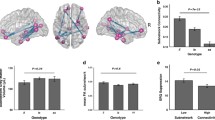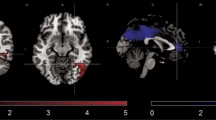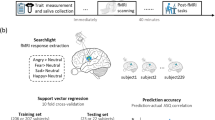Abstract
The s/s-genotype of the 5-HTTLPR polymorphism and the personality trait of neuroticism have both been associated with experiences of negative affect, anxiety and mood disorders, as well as an emotional processing bias towards negative facial emotions. On a neural level, this bias can be characterized by altered amygdala and fusiform gyrus (FFG) activity during perception of negative facial expressions. Using resting-state functional magnetic resonance imaging in a multi-center-sample of 178 healthy subjects of European descent, this study investigated the association of 5-HTTLPR (short s- and long l-allele) including the genotype of the single nucleotide polymorphism (SNP) rs25531 (A/G) within this region polymorphism, and trait neuroticism on resting-state functional connectivity (rs-FC) between amygdala and the FFG. Moreover, we aimed to identify additional brain regions with associations of 5-HTTLPR/rs25531 (combined according to its expression; low: s/s; high: lA/lA; intermediate: s/lA, s/lG, lG/lG, lA/lG) and trait neuroticism to amygdala rs-FC. Separate analyses for 5-HTTLPR/rs25531 and neuroticism (controlling for age, gender, handedness, and research site) revealed that s/s-homozygotes and individuals high in neuroticism obtained altered amygdala rs-FC in the right occipital face area, which is considered to be a “core component” of the face processing system. Importantly, effects of neuroticism were replicated across three independent research sites. Additionally, associations of 5-HTTLPR/rs25531 genotype and amygdala rs-FC were observed in the anterior and posterior cingulate cortex, whereas neuroticism was not related to rs-FC in these areas. The presented data implies that 5-HTTLPR/rs25531 variants and neuroticism are linked by resting state functional connectivity of amygdala and fusiform gyrus and suggests that variants of 5-HTTLPR/rs25531 genotype and different levels of neuroticism may partly account for altered processing of negative facial emotions.


Similar content being viewed by others
References
Adelstein JS, Shehzad Z, Mennes M, DeYoung CG, Zuo X-N, Kelly C et al (2011) Personality is reflected in the brain’s intrinsic functional architecture. PLoS One 6:e27633
Berman MG, Peltier S, Nee DE, Kross E, Deldin PJ, Jonides J (2011) Depression, rumination and the default network. Soc Cogn Affect Neurosci 6:548–555
Buckholtz JW, Callicott JH, Kolachana B, Hariri AR, Goldberg TE, Genderson M et al (2008) Genetic variation in MAOA modulates ventromedial prefrontal circuitry mediating individual differences in human personality. Mol Psychiatry 13:313–324
Chan SWY, Norbury R, Goodwin GM, Harmer CJ (2009) Risk for depression and neural responses to fearful facial expressions of emotion. Br J Psychiatry 194:139–145
Chang C, Metzger CD, Glover GH, Duyn JH, Heinze H-J, Walter M (2013) Association between heart rate variability and fluctuations in resting-state functional connectivity. Neuroimage 68:93–104
Clark VP, Keil K, Maisog JM, Courtney S, Ungerleider LG, Haxby JV (1996) Functional magnetic resonance imaging of human visual cortex during face matching: a comparison with positron emission tomography. Neuroimage 4:1–15
Cools R, Calder AJ, Lawrence AD, Clark L, Bullmore E, Robbins TW (2005) Individual differences in threat sensitivity predict serotonergic modulation of amygdala response to fearful faces. Psychopharmacology 180:670–679
Costa PT, McCrae RR (1992) Revised NEO Personality Inventory (NEO-PI-R) and NEO Five-Factor Inventory (NEO-FFI) professional manual. Psychological Assessment Resources, Odessa
Del-Ben CM, Deakin JFW, McKie S, Delvai NA, Williams SR, Elliott R et al (2005) The effect of citalopram pretreatment on neuronal responses to neuropsychological tasks in normal volunteers: an FMRI study. Neuropsychopharmacology 30:1724–1734
Demaree HA, Pu J, Jesberger J, Feeny N, Jeng L, Everhart DE et al (2009) 5HTTLPR predicts left fusiform gyrus activation to positive emotional stimuli. Magn Reson Imaging 27:441–448
Derryberry D, Reed MA (1994) Temperament and attention: orienting toward and away from positive and negative signals. J Pers Soc Psychol 66:1128–1139
Dorado P, Peñas-Lledó EM, González AP, Cáceres MC, Cobaleda J, Llerena A (2007) Increased risk for major depression associated with the short allele of the serotonin transporter promoter region (5-HTTLPR-S) and the CYP2C9*3 allele. Fundam Clin Pharmacol 21:451–453
Erk S, Meyer-Lindenberg A, Schnell K, Opitz von Boberfeld C, Esslinger C, Kirsch P et al (2010) Brain function in carriers of a genome-wide supported bipolar disorder variant. Arch Gen Psychiatry 67:803–811
Esslinger C, Walter H, Kirsch P, Erk S, Schnell K, Arnold C et al (2009) Neural mechanisms of a genome-wide supported psychosis variant. Science 324:605
Flory JD, Manuck SB, Ferrell RE, Dent KM, Peters DG, Muldoon MF (1999) Neuroticism is not associated with the serotonin transporter (5-HTTLPR) polymorphism. Mol Psychiatry 4:93–96
Gillespie NA, Whitfield JB, Williams B, Heath AC, Martin NG (2005) The relationship between stressful life events, the serotonin transporter (5-HTTLPR) genotype and major depression. Psychol Med 35:101–111
Gollan JK, Pane HT, McCloskey MS, Coccaro EF (2008) Identifying differences in biased affective information processing in major depression. Psychiatry Res 159:18–24
Gonda X, Fountoulakis KN, Juhasz G, Rihmer Z, Lazary J, Laszik A et al (2009) Association of the s allele of the 5-HTTLPR with neuroticism-related traits and temperaments in a psychiatrically healthy population. Eur Arch Psychiatry Clin Neurosci 259:106–113
Gschwind M, Pourtois G, Schwartz S, Van De Ville D, Vuilleumier P (2012) White-matter connectivity between face-responsive regions in the human brain. Cereb Cortex 22:1564–1576
Halgren E, Dale AM, Sereno MI, Tootell RB, Marinkovic K, Rosen BR (1999) Location of human face-selective cortex with respect to retinotopic areas. Hum Brain Mapp 7:29–37
Hamilton JP, Furman DJ, Chang C, Thomason ME, Dennis E, Gotlib IH (2011) Default-mode and task-positive network activity in major depressive disorder: implications for adaptive and maladaptive rumination. Biol Psychiatry 70:327–333
Hariri AR, Mattay VS, Tessitore A, Kolachana B, Fera F, Goldman D et al (2002) Serotonin transporter genetic variation and the response of the human amygdala. Science 297:400–403
Harmer CJ, Mackay CE, Reid CB, Cowen PJ, Goodwin GM (2006) Antidepressant drug treatment modifies the neural processing of nonconscious threat cues. Biol Psychiatry 59:816–820
Hauser J, Leszczyńska A, Samochowiec J, Czerski PM, Ostapowicz A, Chlopocka M et al (2003) Association analysis of the insertion/deletion polymorphism in serotonin transporter gene in patients with affective disorder. Eur Psychiatry 18:129–132
Haxby JV, Hoffman EA, Gobbini MI (2000) The distributed human neural system for face perception. Trends Cogn Sci 4:223–233
He Y, Zang Y, Jiang T, Gong G, Xie S, Xiao J (2006) Handedness-related functional connectivity using low-frequency blood oxygenation level-dependent fluctuations. Neuroreport 17:5–8
Heils A, Teufel A, Petri S, Stober G, Riederer P, Bengel D, Lesch KP (1996) Allelic variation of the human serotonin transporter gene expression. J Neurochem 66:2621–2624
Heinz A, Braus DF, Smolka MN, Wrase J, Puls I, Hermann D et al (2005) Amygdala-prefrontal coupling depends on a genetic variation of the serotonin transporter. Nat Neurosci 8:20–21
Herrington JD, Taylor JM, Grupe DW, Curby KM, Schultz RT (2011) Bidirectional communication between amygdala and fusiform gyrus during facial recognition. Neuroimage 56:2348–2355
Horn DI, Yu C, Steiner J, Buchmann J, Kaufmann J, Osoba A et al (2010) Glutamatergic and resting-state functional connectivity correlates of severity in major depression: the role of pregenual anterior cingulate cortex and anterior insula. Front Syst Neurosci. doi:10.3389/fnsys.2010.00033
Hu X-Z, Lipsky RH, Zhu G, Akhtar LA, Taubman J, Greenberg BD et al (2006) Serotonin transporter promoter gain-of-function genotypes are linked to obsessive-compulsive disorder. Am J Hum Genet 78:815–826
Kanwisher N, McDermott J, Chun MM (1997) The fusiform face area: a module in human extrastriate cortex specialized for face perception. J Neurosci 17:4302–4311
Karg K, Burmeister M, Shedden K, Sen S (2011) The serotonin transporter promoter variant (5-HTTLPR), stress, and depression meta-analysis revisited: evidence of genetic moderation. Arch Gen Psychiatry 68:444–454
Kendler KS, Kuhn J, Prescott CA (2004) The interrelationship of neuroticism, sex, and stressful life events in the prediction of episodes of major depression. Am J Psychiatry 161:631–636
Kendler KS, Gatz M, Gardner CO, Pedersen NL (2006) Personality and major depression: a Swedish longitudinal, population-based twin study. Arch Gen Psychiatry 63:1113–1120
Kiyohara C, Yoshimasu K (2010) Association between major depressive disorder and a functional polymorphism of the 5-hydroxytryptamine (serotonin) transporter gene: a meta-analysis. Psychiatr Genet 20:49–58
Körner A, Drapeau M, Geyer M, Albani C, Brähler E (2008) Deutsche Normierung des NEO-Fünf-Faktoren Inventars (NEO-FFI) (German norms for the NEO-Five-Factor Inventory). Zeitschrift fuer Medizinische Psychologie (J Med Psychol) 17:133–144
Lasky-Su JA, Faraone SV, Glatt SJ, Tsuang MT (2005) Meta-analysis of the association between two polymorphisms in the serotonin transporter gene and affective disorders. Am J Med Genet B Neuropsychiatr Genet 133B:110–115
Lesch KP, Mössner R (1998) Genetically driven variation in serotonin uptake: is there a link to affective spectrum, neurodevelopmental, and neurodegenerative disorders? Biol Psychiatry 44:179–192
Lesch KP, Bengel D, Heils A, Sabol SZ, Greenberg BD, Petri S, Benjamin J, Muller CR, Hamer DH, Murphy DL (1996) Association of anxiety-related traits with a polymorphism in the serotonin transporter gene regulatory region. Science 274:1527–1531
Li S, Zou Q, Li J, Li J, Wang D, Yan C et al (2012) 5-HTTLPR polymorphism impacts task-evoked and resting-state activities of the amygdala in Han Chinese. PLoS One 7:e36513
Li Y, Qin W, Jiang T, Zhang Y, Yu C (2012) Sex-dependent correlations between the personality dimension of harm avoidance and the resting-state functional connectivity of amygdala subregions. PLoS One 7:e35925
Lieberman MD, Cunningham WA (2009) Type I and Type II error concerns in fMRI research: re-balancing the scale. Soc Cogn Affect Neurosci 4:423–428
Liu J, Harris A, Kanwisher N (2010) Perception of face parts and face configurations: an FMRI study. J Cogn Neurosci 22:203–211
Lotrich FE, Pollock BG (2004) Meta-analysis of serotonin transporter polymorphisms and affective disorders. Psychiatr Genet 14:121–129
Munafò MR, Freimer NB, Ng W, Ophoff R, Veijola J, Miettunen J et al (2009) 5-HTTLPR genotype and anxiety-related personality traits: a meta-analysis and new data. Am J Med Genet B Neuropsychiatr Genet 150B:271–281
Murphy K, Birn RM, Handwerker DA, Jones TB, Bandettini PA (2009) The impact of global signal regression on resting state correlations: are anti-correlated networks introduced? Neuroimage 44:893–905
Murphy SE, Norbury R, Godlewska BR, Cowen PJ, Mannie ZM, Harmer CJ et al (2013) The effect of the serotonin transporter polymorphism (5-HTTLPR) on amygdala function: a meta-analysis. Mol Psychiatry 18:512–520
Perlman SB, Morris JP, Vander Wyk BC, Green SR, Doyle JL, Pelphrey KA (2009) Individual differences in personality predict how people look at faces. PLoS One 4:e5952
Pezawas L, Meyer-Lindenberg A, Drabant EM, Verchinski BA, Munoz KE, Kolachana BS et al (2005) 5-HTTLPR polymorphism impacts human cingulate-amygdala interactions: a genetic susceptibility mechanism for depression. Nat Neurosci 8:828–834
Pitcher D, Walsh V, Duchaine B (2011) The role of the occipital face area in the cortical face perception network. Exp Brain Res 209(4):481–493
Rao H, Gillihan SJ, Wang J, Korczykowski M, Sankoorikal GMV, Kaercher KA et al (2007) Genetic variation in serotonin transporter alters resting brain function in healthy individuals. Biol Psychiatry 62:600–606
Roiser JP, de Martino B, Tan GC, Kumaran D, Seymour B, Wood NW, Dolan RJ (2009) A genetically mediated bias in decision making driven by failure of amygdala control. J Neurosci 29:5985–5991
Schinka JA, Busch RM, Robichaux-Keene N (2004) A meta-analysis of the association between the serotonin transporter gene polymorphism (5-HTTLPR) and trait anxiety. Mol Psychiatry 9:197–202
Sen S, Burmeister M, Ghosh D (2004) Meta-analysis of the association between a serotonin transporter promoter polymorphism (5-HTTLPR) and anxiety-related personality traits. Am J Med Genet B Neuropsychiatr Genet 127B:85–89
Sheline YI, Barch DM, Donnelly JM, Ollinger JM, Snyder AZ, Mintun MA (2001) Increased amygdala response to masked emotional faces in depressed subjects resolves with antidepressant treatment: an fMRI study. Biol Psychiatry 50:651–658
Song J, Desphande AS, Meier TB, Tudorascu DL, Vergun S, Nair VA et al (2012) Age-related differences in test-retest reliability in resting-state brain functional connectivity. PLoS One 7:e49847
Stein JL, Wiedholz LM, Bassett DS, Weinberger DR, Zink CF, Mattay VS et al (2007a) A validated network of effective amygdala connectivity. Neuroimage 36:736–745
Stein MB, Simmons AN, Feinstein JS, Paulus MP (2007b) Increased amygdala and insula activation during emotion processing in anxiety-prone subjects. Am J Psychiatry 164:318–327
Surguladze SA, Young AW, Senior C, Brébion G, Travis MJ, Phillips ML (2004) Recognition accuracy and response bias to happy and sad facial expressions in patients with major depression. Neuropsychology 18:212–218
Surtees PG, Wainwright NW, Willis-Owen SA, Luben R, Day NE, Flint J (2006) Social adversity, the serotonin transporter (5-HTTLPR) polymorphism and major depressive disorder. Biol Psychiatry 59:224–229
Terracciano A, Balaci L, Thayer J, Scally M, Kokinos S, Ferrucci L et al (2009) Variants of the serotonin transporter gene and NEO-PI-R neuroticism: no association in the BLSA and SardiNIA samples. Am J Med Genet B Neuropsychiatr Genet 150B:1070–1077
Van der Veen FM, Evers EAT, Deutz NEP, Schmitt JAJ (2007) Effects of acute tryptophan depletion on mood and facial emotion perception related brain activation and performance in healthy women with and without a family history of depression. Neuropsychopharmacology 32:216–224
Vuilleumier P, Armony JL, Driver J, Dolan RJ (2001) Effects of attention and emotion on face processing in the human brain: an event-related fMRI study. Neuron 30:829–841
Vuilleumier P, Armony JL, Driver J, Dolan RJ (2003) Distinct spatial frequency sensitivities for processing faces and emotional expressions. Nat Neurosci 6:624–631
Vuilleumier P, Richardson MP, Armony JL, Driver J, Dolan RJ (2004) Distant influences of amygdala lesion on visual cortical activation during emotional face processing. Nat Neurosci 7:1271–1278
Weinstock LM, Whisman MA (2006) Neuroticism as a common feature of the depressive and anxiety disorders: a test of the revised integrative hierarchical model in a national sample. J Abnorm Psychol 115:68–74
Weissenbacher A, Kasess C, Gerstl F, Lanzenberger R, Moser E, Windischberger C (2009) Correlations and anticorrelations in resting-state functional connectivity MRI: a quantitative comparison of preprocessing strategies. Neuroimage 47:1408–1416
Wendland JR, Martin BJ, Kruse MR, Lesch K-P, Murphy DL (2006) Simultaneous genotyping of four functional loci of human SLC6A4, with a reappraisal of 5-HTTLPR and rs25531. Mol Psychiatry 11:224–226
Whitfield-Gabrieli S, Ford JM (2012) Default mode network activity and connectivity in psychopathology. Annu Rev Clin Psychol 8:49–76
Wiggins JL, Bedoyan JK, Peltier SJ, Ashinoff S, Carrasco M, Weng SJ, Welsh RC, Martin DM, Monk CS (2012) The impact of serotonin transporter (5-HTTLPR) genotype on the development of resting-state functional connectivity in children and adolescents: a preliminary report. Neuroimage 59:2760–2770
Willis-Owen SA, Turri MG, Munafo MR, Surtees PG, Wainwright NW, Brixey RD, Flint J (2005) The serotonin transporter length polymorphism, neuroticism, and depression: a comprehensive assessment of association. Biol Psychiatry 58:451–456
Yan (2010) DPARSF: a MATLAB toolbox for “pipeline” data analysis of resting-state fMRI. Front Syst Neurosci. doi:10.3389/fnsys.2010.00013
Acknowledgments
Funding for this study was provided by the German Ministry for Education and Research (BMBF) grant NGFNplus MooDS, by the German Research Foundation (DFG) grant SFB 636-B7, and partly supported by the DFG grant SFB940/1 2013.
Conflict of interest
The authors declare no conflict of interest.
Author information
Authors and Affiliations
Corresponding authors
Additional information
J. D. Kruschwitz and M. Walter shared first author.
A. Meyer-Lindenberg and H. Walter shared senior author.
Electronic supplementary material
Below is the link to the electronic supplementary material.
Rights and permissions
About this article
Cite this article
Kruschwitz, J.D., Walter, M., Varikuti, D. et al. 5-HTTLPR/rs25531 polymorphism and neuroticism are linked by resting state functional connectivity of amygdala and fusiform gyrus. Brain Struct Funct 220, 2373–2385 (2015). https://doi.org/10.1007/s00429-014-0782-0
Received:
Accepted:
Published:
Issue Date:
DOI: https://doi.org/10.1007/s00429-014-0782-0




